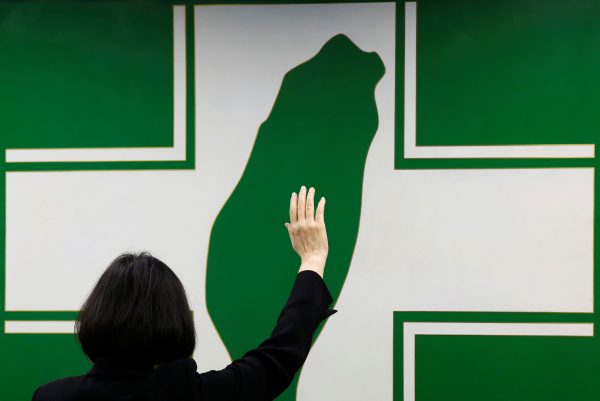, but the good old days of stability have been replaced by a stalemate after the DPP returned in 2016.
Although the Tsai Ing-wen administration has promised to maintain the status quo and has not provoked Beijing, it has refused to speak on Beijing’s terms. President Tsai Ing-wen feels that it would not only alienate her DPP supporters but also violate some of her own beliefs.
Labelling Tsai another trouble-maker, Jin Canrong of Beijing’s Renmin University suggested that Tsai appears softer than Chen Shui-bian but is more determined to pursue Taiwan independence. Zhong Houtang of the Institute of Taiwan Studies at CASS predicted that although Tsai has promised the status quo, she would certainly reverse three aspects of the Ma administration’s mainland policy.
First, Tsai would place Taiwan’s foreign relations above cross-strait relations. Second, Tsai would replace Ma’s flexible diplomacy for soft independent diplomacy. Third, Tsai would reverse Ma’s policy of going to the world via the mainland and move closer to the US and Japan.
After the electoral victory in January 2016, Tsai promised to maintain the status quo and commit to ‘the constitutional order of the Republic of China’. To moderate traditional DPP policy, she said that she would ‘continue to work for cross-strait peace and stability and the development of cross-strait relations on such “political bases” as the historical fact of the 1992 cross-strait talks between the two bodies, the two sides’ common acknowledgment that they should seek common ground while reserving differences and the constitutional system in force of the Republic of China’.
But Beijing’s Taiwan Affairs Office issued a statement that ‘peaceful growth’ of relations would be impossible unless Tsai asserted that ‘both the mainland and Taiwan belong to one and the same China’. Warning that cross-strait relations had come to an important turning point, Beijing suspected that Tsai’s ‘status quo’ and ‘constitution order’ were redolent of a circuitous ‘two-country’ theory.
The 1992 Consensus — in which both sides agreed that there is one China — was important for Beijing as a fig leaf to cover up the differences between the mainland and Taiwan: it creates the impression of an accord. The mainland officials have rarely, if ever, mentioned that the two parties interpret the agreement differently — that ‘one China’ means two different things. Unless Tsai and the DPP accept the 1992 consensus, China would take this as desirous of changing the status quo.
In her inauguration speech, Tsai avoided using the word ‘consensus’, but said she respected the ‘historical fact’ that a meeting took place in 1992, during which Taiwan and the mainland sought common ground and tried to set aside differences. Tsai’s statements could be interpreted as an implicit acknowledgement of the 1992 consensus. Tsai endorsed KMT-era laws such as ‘the Act Governing Relations between the People of the Taiwan Area and the Mainland Area’, that assumes the eventual reunification of the two sides.
But Beijing is not satisfied. The Taiwan Affairs Office had a simple rejoinder that Tsai’s speech was an ‘incomplete test answer’. Instead, Beijing voiced that she must clearly state that she acknowledges the 1992 consensus, rather than be ‘ambiguous and evasive’. The Taiwan Affairs Office suspended communications with its Taiwanese counterpart, the Mainland Affairs Council of Executive Yuan, soon after Tsai’s inauguration. The two government agencies were one of the primary channels of official communication in cross-strait talks during the Ma administration. Beijing also halted the longstanding semi-official channel between the Association for Relations across the Taiwan Straits and the Straits Exchange Foundation. By refusing to communicate, Beijing could make it difficult for the Tsai government to fulfill its obligations to its citizens.
In her July 2016 interview with the Washington Post, Tsai was asked how she was going to continue to communicate with the mainland in light of its recent move to sever communication ties. Her response was that ‘we have always had diverse channels of communication across the strait. These include not just official communications but also people-to-people contacts’.
Li Peng, Deputy Director of Taiwan Research Institute in Xiamen, commented that the so-called ‘people to people contacts’ were not authorised and could not be verified. If Tsai counted them as ‘communication channels’, that meant that she was at the end of her rope and desperate. The suspension of the official communication mechanism has served Beijing’s effort to increase pressure on the Tsai administration.
But Beijing’s pressure has not brought Tsai to endorse the 1992 consensus. In her Washington Post interview, Tsai was asked whether she agreed with some academics that Chinese leader Xi Jinping had a deadline by which he wanted Tsai to agree to the 1992 Consensus. Tsai said that ‘it isn’t likely that the government of Taiwan will accept a deadline for conditions that are against the will of the people’. The answer was interpreted by mainland media as the first time that Tsai officially refused to accept the 1992 consensus and exposed her pro-independence stance.
As the possibility of confrontation across the Taiwan Strait has increased, dealing with the mainland is becoming an increasingly delicate issue for the Tsai administration. Refusing to endorse the 1992 consensus, the Tsai administration has demonstrated that it is not the Chen Shui-bian administration 2.0.
Suisheng Zhao is Professor and Director of the Center for China-US Cooperation at Josef Korbel School of International Studies, University of Denver and Editor of the Journal of Contemporary China.


Since she was sworn in on May 20 her approval rating has dipped below 50% and her disapproval rating has increased to almost 40%. Tsai’s main pressure does not come from Beijing but from the infighting of different factions within her own political party. She has lost control over her own political party. She can no longer pretend to be a moderate but to revert to her original hard line position. Cross Straits confrontation is not only probable but inevitable. The US has another hot potato.